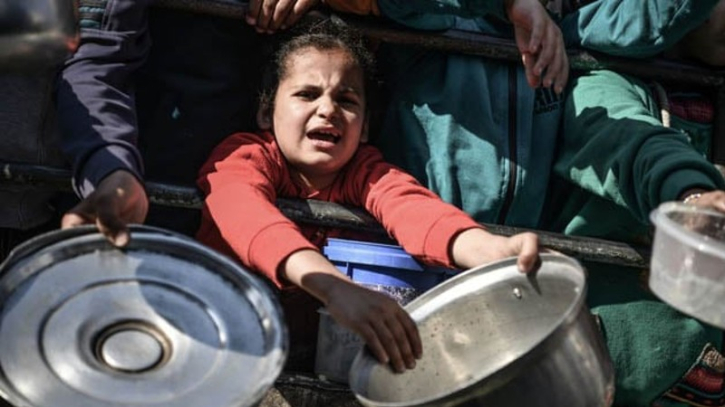
Famine imminent in north Gaza, an ’unprecedented’ crisis: UN
"Half of Gazans are experiencing 'catastrophic' hunger, with famine projected to hit the north of the territory by May unless there is urgent intervention, a United Nations-backed food security assessment warned on Monday.
"People in Gaza are starving to death right now. The speed at which this man-made hunger and malnutrition crisis has ripped through Gaza is terrifying," said Cindy McCain, head of the UN's World Food Programme (WFP).
The Integrated Food Security Phase Classification (IPC) partnership estimated on Monday that 1.1 million people—half the population, according to UN data—were facing catastrophic conditions.
"To have 50 percent of an entire population in catastrophic, near-famine levels is unprecedented," said Beth Bechdol, deputy director-general of the UN's Food and Agriculture Organization (FAO), told AFP.
The WFP said this was the "highest number of people ever recorded as facing catastrophic hunger" under the IPC system, originally developed in 2004.
The situation is particularly dire in the north of Gaza, where the UN says there are about 300,000 people—and where the IPC said famine was "imminent... projected to occur anytime between mid-March and May".
Martin Griffiths, the UN's humanitarian chief, called for Israel to allow unfettered access for aid to the besieged Palestinian territory, saying there was "no time to lose".
"The international community should hang its head in shame for failing to stop this," he said.
US State Department spokesman Vedant Patel said the findings were "alarming" and revealed a "heartwrenching" picture of "children who are starving".
"That is why we believe so strongly that everything must be done to scale up the delivery of humanitarian assistance," he said.
- 'Wasted' children -
The bloodiest-ever Gaza war broke out after Hamas launched an unprecedented attack on Israel on October 7, to which Israel responded with a relentless bombing campaign and ground offensive in the Hamas-run Palestinian territory.
With aid agencies reporting huge difficulties gaining access to Gaza, particularly the north, the UN has warned for weeks that a famine is looming.
The IPC said on Monday that while the technical criteria for famine had not yet been met, "all evidence points towards a major acceleration of deaths and malnutrition".
The report highlighted the horrific toll on children.
"Hunger is a slow and painful death," said Hiba Tibi, country director for the CARE international aid group, who reported aid workers seeing children "who can barely talk and walk" for lack of food.
A famine is declared when 20 percent of households face an extreme food shortage—which is the case in Gaza, the UN says.
Other criteria are that one in three children is acutely malnourished, and that at least two in every 10,000 people die every day of starvation or malnutrition.
According to the WFP, "one in three children below the age of two is now acutely malnourished, or 'wasted'", meaning they are dangerously thin.
In a statement, the World Health Organization pointed to the lasting effects of malnutrition, particularly on children, warning that the "current situation will have long-term effects on the lives and health of thousands".
"This compromises the health and well-being of an entire future generation," it added.
WFP chief economist Arif Husain said the final criteria for declaring a famine—the mortality rate—could be met within weeks.
The FAO said it could be already happening in the north, where data is patchy.
"Waiting for a retrospective famine classification before acting is indefensible," the IPC said.
- Aid convoys -
Donors have turned to deliveries by air or sea, but these are not viable alternatives to land deliveries, UN agencies say.
Aid charity Oxfam on Monday accused Israel of continuing to "systematically and deliberately block and undermine" the delivery of aid into Gaza, in violation of international humanitarian law.
Bechdol, of the FAO, told AFP that Gazans are "turning to alternative sources" for food, including animal feed and "inedible items, purely out of desperation".
Israel has repeatedly defended its procedures for allowing aid into Gaza, with COGAT—a defense ministry body governing civilian affairs in the occupied Palestinian territories—saying in a statement on X that 222 trucks of supplies had entered on Monday, two-thirds of them carrying food.
WFP said meeting basic food needs would require at least 300 trucks to enter Gaza every day, especially in the north.
The agency has managed to get only nine convoys into the north since January, the latest on Sunday night involving 18 truckloads of food supplies delivered to Gaza City.
"Our hope is we can still avert a full-fledged famine," said the WFP's Husain.
"But the window is shutting, and it is shutting very, very fast."


























